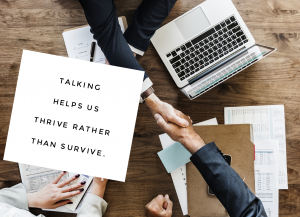OH MY GOD…. Who’s going to employ me now?
 Speaking to a friend the other day she was reflecting about the importance of keeping mental health live in our conversations – we should keep talking about it! She said she’d attended an event run by her company, and her and one other person had turned up for it. She said that not only did she feel sad that not many people turned up to hear more about such an important subject, but also that she felt people were looking at her as if she must have a problem. She felt uncomfortable, she felt that she was being judged for just being there, imagining people saying ‘she must need help if she’s going to that….’ However, as I say both in my workshops and with my individual clients. We all have mental health it about looking after it, so we thrive rather than just survive that’s important!
Speaking to a friend the other day she was reflecting about the importance of keeping mental health live in our conversations – we should keep talking about it! She said she’d attended an event run by her company, and her and one other person had turned up for it. She said that not only did she feel sad that not many people turned up to hear more about such an important subject, but also that she felt people were looking at her as if she must have a problem. She felt uncomfortable, she felt that she was being judged for just being there, imagining people saying ‘she must need help if she’s going to that….’ However, as I say both in my workshops and with my individual clients. We all have mental health it about looking after it, so we thrive rather than just survive that’s important!
At the end of 2015 I experienced this exact feeling. I felt the stigma of having a mental health issue.
After 4 years of hard work both in my personal life, and career wise, with a husband working away for 4 days a week, 2 babies at home and working full-time in a job where I travelled every week, I was putting a lot of pressure on myself. I then experienced ill health as I was diagnosed with cancer. Luckily for me it was found in the earlier stages. However, it came at a point in my life when I was running out of steam. I have always been determined and my mindset was very much that I should just get on with things…. don’t let things get me down…there are people out there who are worse off than me…
Over the last few years, emphasis on Mental Health has increased which is great to see. Business are talking more about Health and Wellbeing in support of their employees. As humans we understand the importance, we are logical intellectual people who care about others. However often businesses struggle. They have policies, provide resources, helplines, Occupational Health and possibly mental health advisers that people can be directed towards, but engaging their employees to reach out and use this support is really challenging.
At the end of the day it is the individual that needs to make the changes for themselves, and as a collective to break down the stigma about doing so. I look back at my story and can now see the warning signs. My mum even said to me ‘you are going to run yourself into the ground’. However, when I was in the middle of it, all I said was “there is nothing I can do”. I now know this isn’t true. I know this because I did get myself out of it. It could have happened sooner – my own hypnotherapist even asked me why I didn’t come back him sooner as I’d seen him in the past and knew he could help. It was a GOOD QUESTION…. I got lost, I knew better but I couldn’t help myself. However, I was back and slowly but surely, I started to focus on myself and what I needed.
My Husband had taken a job back in Bristol to be more local after I’d been diagnosed with cancer and after my treatment, I had returned to work. Even after everything we said we’d change, I had still continued to put that pressure on myself, feeling like I was failing, feeling guilty for not being at home when I was at work, or not being at work when I was at home. Until it all came to head and I made one of the toughest decisions of my life (not being a quitter) and I asked my manager, for the sake of my health, and for the business, to move me out of my role. My manager and other people around me were truly supportive, and all they wanted was the best for me. They wanted me to feel better. But even with their support, I can still remember speaking to the HR business partner with my CV, looking for another job in the business, and saying to him, ‘but who is going to want to employ me now?’ He reassured me, and told me people would, but did I truly believe him? I eventually decided that I needed time for myself to really recover so I took a sabbatical from work.
During that 6 months, I slowly but surely realised that it was OK to take time for me and that the less pressure I put on myself, the quicker things would all fall into place. I volunteered with a small company of like minded people to help build my confidence up again, went to networking events to meet people and figured out what I really wanted.
I now look back at 2015 and still see it as the worst year of my life, however, I also look at it with a sense of acceptance, maybe even relief and happiness that it happened. If it hadn’t, I wouldn’t be where I am now! Given my own experience, I wanted to share my own top tips to help you start making small changes towards achieving a healthier mental state and for those of you leading teams or working with others, to support them to do the same:
As an Individual
1. Speak to you manager/HR – Ask for help. What is the policy? Occupational Health Support?
2. Speak to team members that are close to you, that you feel you can confide in.
3. Thought management. Detach yourself from the emotion. Do you like how something makes you feel? If not, how do you want to feel? What do you need to do to achieve that?
4. Take time to do nothing. Make sure you have a lunch break, go away from your desk and have a walk.
5. Don’t be afraid to get professional help. Solution focused Hypnotherapy is a very effective way of dealing with stress or mental health issues, using NLP and CBT techniques. There are many types of therapies out there though. Find one that feels right for you.
6. BE KIND to yourself – I can assure you, there are others that feel the same. This is a period of your life. It does not mean you are incapable of doing your job, or weak. Remember when our stress bucket is full up, we will work in the flight/flight or freeze part of the brain (the emotional part). We become very good at being our harshest critic, our confidence dips, and we struggle to make decisions. Living with bad mental health takes a lot of strength, so remember, you are amazing.
As a team or helping someone else
7. If you see someone who may need help, be there to listen to them and ask them what support they want from you. Encourage them to speak to their manager if at all appropriate.
8. Team meetings – keep a rolling  agenda item which focuses on Health and Wellbeing so that it becomes a normal part of your team dialogue – talk about possible things you can do as a team to ensure that people’s health (including mental health) is seen as a priority by everyone.
agenda item which focuses on Health and Wellbeing so that it becomes a normal part of your team dialogue – talk about possible things you can do as a team to ensure that people’s health (including mental health) is seen as a priority by everyone.
9. Practice mindfulness – set up a group where people can go walking/running/practice mindfulness at lunch time. Make it inclusive for everyone who wants to join in.
10. Use mindfulness sessions for 10 mins each morning – apps can be used or look for experts to come in.
11. Share the moments where you yourself feel stress and how you are going to tackle it. It’s important to keep this as positive as possible, so focus on solutions – what you can do to improve things. By doing so, you may help others, which always makes us feel good as well.
At the end of day stigma comes of our own thinking. In my situation, I had believed that people would only see the negative, even if that wasn’t true! By continuing to think that Bad Mental Health is something to be ashamed of and by not talking about it, the stigma will continue. It is only when we are brave and start to talk about it, that the stigma will disappear. Humans naturally want to help each other. We are better as a tribe than as an individual. Some people may not know what to do to help you, so be brave and tell them what you actually need from them.
If you do need a little more help in changing patterns and improving your mental health so you thrive rather than just survive, I’m a Hypnotherapist in Kingsbridge Area working face to face or on Skype – contact me. And remember to talk!
For more information go to my website: www.AmyJohnsHypnotherapy.co.uk or follow me on Facebook: www.facebook.com/AmyJohnsHypnotherapy

Leave a Reply